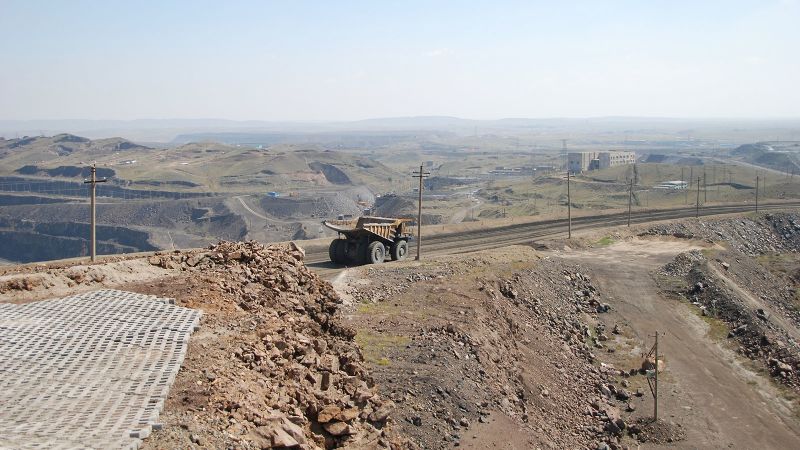The ongoing dispute between the European Union (EU) and China regarding rare earth materials has escalated into a significant diplomatic and economic issue. Rare earths are essential components in a variety of products, including automobiles and household appliances. Consequently, the EU has called upon China to alleviate its export restrictions, which have not only disrupted supply chains but also caused considerable production challenges in both Europe and the United States.
At the forefront of this dialogue is Maros Sefcovic, the EU’s trade commissioner, who emphasized the urgency of the matter in his discussions with Chinese Commerce Minister Wang Wentao. The meeting took place during the Organization for Economic Cooperation and Development (OECD) conference held in Paris. Sefcovic expressed grave concerns regarding the impact of the restrictions on the automotive sector, highlighting the importance of rare earth elements and permanent magnets in industrial production broadly. He remarked on the alarming state of the European car industry, underscoring the critical nature of these materials for manufacturing processes.
China’s control over the global supply of rare earths is substantial, with the nation managing approximately 90% of global processing. In April, amid escalating trade tensions with the United States, China instituted stringent export controls on seven types of rare earth minerals and related magnets. These restrictions affect crucial sectors ranging from consumer electronics to military applications, notably impacting defense mechanisms such as the F-35 fighter jets. Despite a temporary 90-day trading truce with the United States, these controls remain in place, intensifying frustrations and admonitory exchanges between Washington and Beijing over alleged breaches of the Geneva agreement.
The ramifications of China’s export strategy are evident, as automotive manufacturers warn of impending factory shutdowns due to their inability to procure essential rare earth magnets. Sefcovic pointed out that permanent magnets are crucial for civilian electronic production, posing a disruptive threat to the entire industry if access continues to be restricted. His warnings have been echoed by industry leaders in Europe, notably from the European Association of Automotive Suppliers (CLEPA), wherein Secretary General Benjamin Krieger noted significant disruptions in the automotive supply chain caused by China’s strict export policy.
Under the new regulations introduced by China, exporters of rare earths must navigate a cumbersome licensing process for each shipment, requiring extensive paperwork to substantiate the intended end use of the materials. Reports indicate that since April, Chinese authorities have only approved about 25% of the myriad of export license applications submitted. Furthermore, the inconsistency in application processes across different provinces has led to confusion and delays, with prospective exporters facing demands for sensitive information and procedural denials.
The German car manufacturer Volkswagen has acknowledged the challenges posed by these restrictions, revealing that its suppliers have only been able to secure a limited allocation of export licenses. Moreover, rare earth shipments from China to Germany halved in the month following the introduction of these controls, signaling grave concerns for manufacturers reliant on these materials.
During the recent meeting between Sefcovic and Wang, discrepancies regarding awarded licenses and applications were noted, leading to a consensus to reconvene once clearer data is established. Sefcovic suggested developing a more systematic approach for export applications as a solution to alleviate stress and delays currently affecting the industry.
The effects of China’s export restrictions extend beyond Europe to the United States, where officials have similarly expressed frustration over the slow approval rates for rare earth exports. Allegations have arisen that China has not lifted restrictions as anticipated due to the trade truce arranged under former President Donald Trump’s administration. While some American automakers have received approval for rare earth imports, the process remains sluggish and convoluted.
An American rare earth trader reported waiting weeks for required shipment approvals, highlighting the stringent requests for information concerning the end users’ facilities, which has met considerable resistance from clients, particularly in defense sectors. The tight scrutiny of even non-restricted materials has led to broader shipping delays, affecting all types of rare earth materials and resulting in increased prices for those with stockpiles. Reports suggest that costs for certain rare earths have surged, occasionally exceeding tenfold increases, which highlights the alarming economic fallout from these restrictions.
In conclusion, the geopolitical tussle surrounding rare earth materials signifies substantial implications for both European and American industries. China’s export controls represent a knotty challenge for various sectors relying on these critical materials, and stakeholders on both sides advocate for more straightforward and equitable trade practices moving forward.



